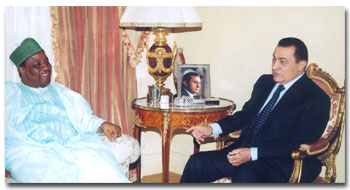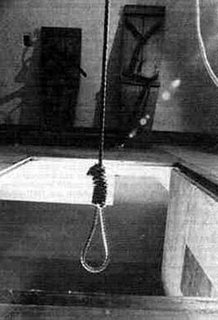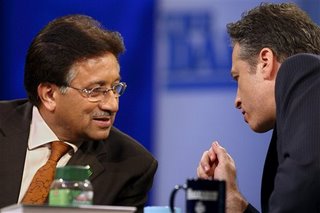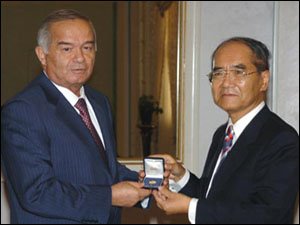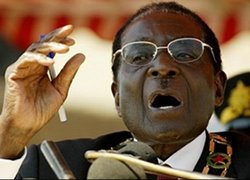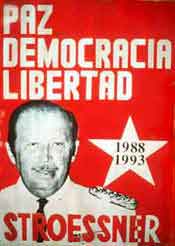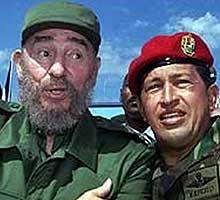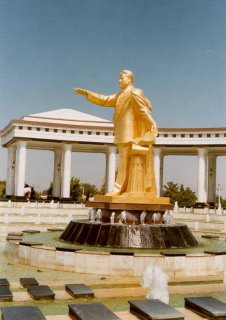 Name:
Name: Saparmurat Atayevich Niazov
Born: Aşgabat,
TSSR (
USSR) February 19, 1940
Length of rule: June 21, 1991 - present (15 years)
Means of ascent to power: Elected
Style: Cult of personalityNOTES:Quick: what the first thing you think of when you hear the word "
Turkmenistan"? For most Americans, the answer would be "What-where-i-stan?". For people fascinated by dictators, however, the sleepy
Central Asian republic is white hot, thanks to its viciously ruthless yet lovably eccentric tyrant, Saparmurat "Turkmenbashi" Niazov. With
rumors of his imminent demise coming from all angles, it behooves me to provide a quick outline of one of the strangest dictators of the past century.
After the catastrophic dissolution of the Soviet Union, the backwater chunk of Central Asia formerly known as the
Turkmen Soviet Socialist Republic found itself, for better or worse, an indepent nation. Politics, like nature, abhors a vacuum, but nobody really took much notice when the leader of the Turkmen Communist Party, an undistinguished hack named Saparmurat Niazov, won newly independent Turkmenistan's first,
and last, presidential election in 1992.
Taking a cue from
Kemal Atatürk, Niazov found the role of "president" a bit too limiting, preferring shrewdly to announce that he had become the very
personification, and even the very
essence of the Turkmen people themselves. Very soon, Saparmurat Niazov, the colorless Soviet
apparatchik, restyled himself as the dynamic
Turkmenbashi, meaning, "leader of all
Turkmen".

Taking a cue from
Josef Stalin, Niazov isolated his nation from the rest of the world and began building a formidable
personality cult. In case anyone might think he's a one trick pony, Niazov also borrowed something from
Mao Zedong (more specifically, Mao's odious
Little Red Book): the
Ruhnama.
Written as a
national epic in a quasi-religious, quasi-nationalistic style, Niazov's Little Green Book humbly purports to be the equal of lesser known works like the
Bible and the
Koran. Lest anyone attempt to diminish the importance of his book, Niazov has made study of
Ruhnama compulsory. If there is anyone in Turkmenistan seeking employment (in the public
or private sector), anyone seeking a driver's license, anyone looking to get married, and so on, he or she had better be able to recite large portions of
Ruhnama by heart.
More ominously, failing to praise the book is a crime against the state, to say nothing of the punishments awaiting anyone who might dare to actually
criticize the book as the rantings of a senile dictator. Niazov is so enamored of his epic, he's
erected statues - even
buildings - in its likeness. When prominent Muslims in Turkmenistan complained about being compelled to put his book next to the Koran, Niazov simply had them thrown in jail and ordered their mosques bulldozed. Perhaps these old fashioned Muslims can be appeased by Niazov's entirely straightfaced declaration that anyone who reads
Ruhnama three times will "automatically" be admitted to heaven. That sure beats blowing yourself up on a bus in Tel Aviv, doesn't it?
While
officially downplaying the extent of his personality cult, Niazov has seen fit to allow several
golden statues of his likeness to remain standing, including a marvelous statue that rotates to face the direction of the sun. It is, perhaps, his crushing ubiquity in Turkmenistan that has provided him to pass some of the world's stupidest laws without his people raising an eyebrow in surprise. These laws include, but are
by no means limited to:
- Outlawing gold teeth in favor of promoting "chewing bones"
- Banning female newscasters from wearing cosmetics
- Bans on karaoke and car stereos
- Replacing the Hippocratic Oath with an oath of allegience to Niazov
It's not known for sure if Niazov's bizarre presidental decrees are serious, or merely an effort to deflect attention from his country's
appalling human rights record and
lousy economy. Whatever the case may be, Turkmenistan is unencumbered by serious political opposition to his rule, much less military threats from at home or abroad. As long as he keeps pumping natural gas to Europe, the rest of the world will be content to paint him as the eccentric ruler of a charming backwater, more than happy to ignore the less amusing aspects of his totalitarian rule.
Still, one has to admire Niazov's sense of style, and his eagerness to set himself apart from the other grey stuffed Soviet suits that took over other former Soviet Republics. Ever seen anything about
Heider Aliev,
Islam Karimov, or
Nursultan Nazarbayev in the insufferable
"wacky news of the day" section of your local newspaper?
Didn't think so.
 Checkmate.
Checkmate.
















